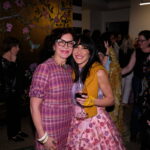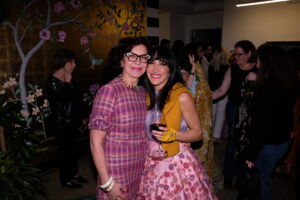In Detroit, there’s an intersection that tells a deeper story than what meets the eye. Nestled between Boston Edison, Atkinson Avenue, La Salle Gardens, and Virginia Park, this cross-section of neighborhoods bears the weight of a city’s history (carries historical legacy)— and the momentum of its future. It was just down the street where the 1967 rebellion ignited, reshaping the trajectory of Detroit. Today, that same ground is being reimagined, not by large developers or out-of-town investors, but by residents who live just a couple blocks away.
Betsy Murdoch is one of them.
In 2015, Murdoch and her husband were house-hunting in the area. “We almost didn’t buy here,” she recalls, “because there was nowhere to walk to — no place to grab a coffee or sit down for a bite.” But the home won them over. And then fate stepped in: just down the road sat a long-abandoned church.
With a background in food and beverage and a shared entrepreneurial spirit with her business partners — including friend and neighbor, Amy Peterson — the vision for what would become The Congregation began to take shape. Today, it’s more than a café. It’s a cornerstone of the community.

BETSY MURDOCH
“Our main focus from the start was: how can we serve our neighbors?” says Murdoch. “We’re lucky to be in a place with deep generational roots and an influx of young professionals. We needed a space that worked for both — a spot to work remotely, study, connect, hear live music, and feel part of something.”
The Congregation sits at the kind of intersection where physical proximity mirrors cultural significance. “This place holds a lot of power,” says George Adams, founder of 360 Detroit and a Virginia Park resident since 2014. “It’s where Boston Edison, Atkinson, and Virginia Park all meet — and it’s become a real hub. The park across the street has a historical marker acknowledging the ’67 rebellion. And the energy The Congregation brings gives people a reason to gather and learn about that history while enjoying the space.”

GEORGE ADAMS
Adams has seen the evolution firsthand. “Back in 2014, when I started 360 Detroit, the area was full of boarded-up homes and overgrown lots. Today, properties are being rehabbed, and new people are moving in. There’s a sense of momentum. But we also have to be aware of challenges like displacement and access to land.”
That tension — between honoring the past and building something new — is precisely what makes The Congregation feel authentic. “We’re always aware of every walk of life in our community,” Murdoch says. “This isn’t just about opening a business. It’s about creating a space that feels welcoming and real.”
Walk into The Congregation on any given day, and you might find a college student typing away on a laptop, a retiree reading the paper, or neighbors catching up over coffee. But that’s only part of the story. The lower level, once unused, has transformed into an event venue. There are comedy nights, singles mixers, dog-friendly happy hours, and even food truck rallies.
A local musician serves as a music curator, booking weekly performances throughout the summer featuring Detroit-based artists. Monthly art exhibits rotate on the walls. The programming is robust — but it’s rooted in a hyperlocal ethos.

MUSIC AT THE CONGREGATION
“Sometimes people come in thinking it’s just a coffee shop,” says Murdoch. “But then they experience everything else — and realize it’s much more. It’s heartwarming to see regulars we know by name and order. That’s when you know you’re doing something right.”
Now, just steps away, a new chapter is unfolding. The Rectory, housed in a former residence that had sat vacant for decades, will soon open as a neighborhood pizzeria.
“We went through a lot to get that building,” Murdoch explains. “It was empty for 20–30 years, changed hands a few times, and was even in the land bank at one point. But we knew it had potential — it felt right.”
The idea to make it a pizza place came naturally. “Pizza is shareable, creative, and communal,” she says. “It just fits.”
The Rectory also introduces a unique approach to seasonality. With a small interior dining room of just 17 seats, the team built an enclosed deck designed to function as a “three-season space.” With temporary walls and heaters, the area could potentially operate most of the year — a move that reflects both flexibility and ambition.
What makes this more than a feel-good story is the business model behind it. The Congregation and The Rectory aren’t projects funded by big developers. They’re founded and operated by people who live within walking distance — people who care deeply about what kind of neighborhood they’re helping shape.
“In a city like Detroit, people want to spend their money in places they believe in,” says Murdoch. “We’ve always said, if we’re going to build something, it has to give back. We don’t just talk about community — we try to live it.”

THE CONGREGATION
Adams agrees. “What’s happening here is unique. This area is between New Center and Boston Edison — I’ve always said, we’re the sandwich filling. We get to decide what kind of sandwich we want to be. And that future? It’s going to be shaped by the people who live here.”
As for Murdoch, her measure of success isn’t just the number of lattes sold or pizzas ordered. “Sometimes, I’m so caught up in the day-to-day that I forget to zoom out. But then I’ll run into a neighbor who tells me how much the space means to them, or that they brought a friend from out of town just to see The Congregation. Those little moments — they change everything.”
As always, be sure to subscribe to our newsletter for regular updates on all things Detroit.






















